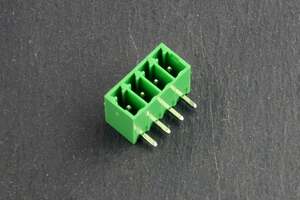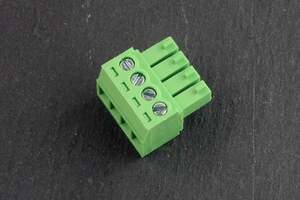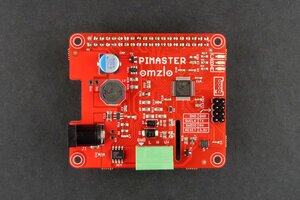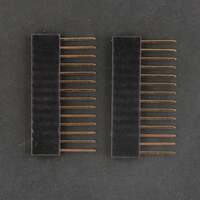The Omzlo CANZERO is an Arduino-compatible board with builtin CANbus networking and designed to be connected to a NoCAN network, enabling you to create wired IoT applications for the home and garden.
If you don't know what NoCAN is, please check our presentation here or our successful Kickstarter campaign.
Description
The Omzlo CANZERO is designed to act as an independent node in a NoCAN wired network. Each CANZERO node can be programmed independently and communicate with other nodes in the network, creating applications with multiple sensors and actuators spread over a distance of 300 meters (1000 feet) and more.
You can use the Arduino IDE to build your application and then upload the created firmware to your CANZERO node directly over the network.
At the heart of each CANZERO node is not one but two MCUs:
- A 48Mhz Atmel SAMD21G18A ARM Cortex M0+ with 256K flash, 32K ram, acting as the main processor.
- A 48Mhz STM32F042 ARM Cortex M0+, with 32K flash, 6K ram, acting as a CAN bus network driver.
Both MCUs communicate with each other through SPI as well as through two additional GPIOs.
The Omzlo CANZERO shares the same mechanical footprint as the Arduino MKR Zero, measuring 61.5mm by 25mm (approx. 2.4" x 1"). As shown in the pinout diagram below, it also shares the same double row of 14-pin 2.54mm headers: most shields designed for the Arduino MKR Zero should work on the Omzlo CANZERO.
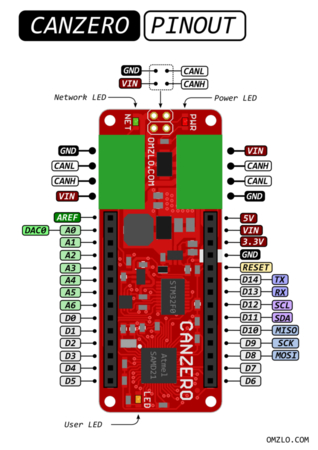
Technical details
The CANZERO board integrates the following components:
- The main MCU: a SAMD21G18A.
- The network driver MCU: an STM32F042.
- A step-down switching regulator providing 5V (500ma max) from the 6V to 28V DC wired input (MCP16301).
- An LDO taking 5V down to 3.3V (300ma max) for the MCUs and board logic levels (MIC5401-3.3).
- A CAN bus transceiver IC (MCP2562).
- Three LEDs:
- Red: power status.
- Green: network or bootloader status.
- Yellow: user-defined (Arduino).
- Two 14-pin 2.54mm headers: provides digital, analog and power connections, following the same pinout as the Arduino MKR Zero.
- Two 4-pin pluggable 3.5mm headers provide connection to the network and power (VIN, GND, CANL, CANH).
- A reverse polarity protection diode and various passives.
The CANbus network runs by default at 125Kbps.
The bottom side of the board provides pin names and connection information.
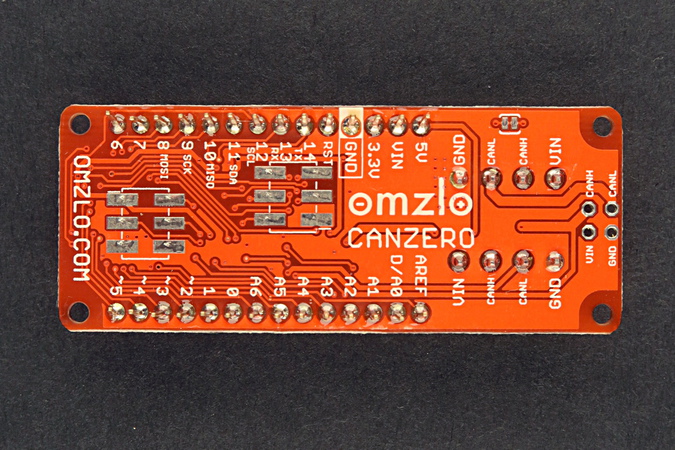
What's included
As shown in the picture below, each CANZERO comes as:
- A fully assembled Arduino-compatible board, except for the 14 pin female headers.
- Two unsoldered 2.54mm 14-pin female headers with long leads.
- Two 4-pin male screw terminal blocks.
- One 2.54mm pitch 40-Pin break-apart male header.
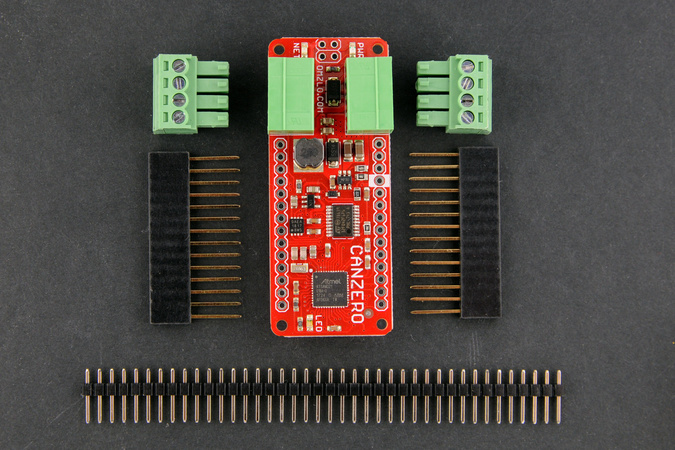
You will need to solder the 14-pin female headers to the board before use. Soldering the headers is easy if you follow the instructions in our detailed installation tutorial.
To build a NoCAN network, you will also need a PiMaster HAT (also available on Tindie), a Raspberry Pi, a power supply and some cables/wires. These elements are not included with the CANZERO and need to be purchased separately.
Resources
This product is open-source / open-hardware.
For more information about the CANZERO and NoCAN, including schematics and source code, check out our documentation and our detailed installation tutorial.
Links to code and documentation
Shipping policy
We ship twice a week, typically on Tuesdays and Fridays.



